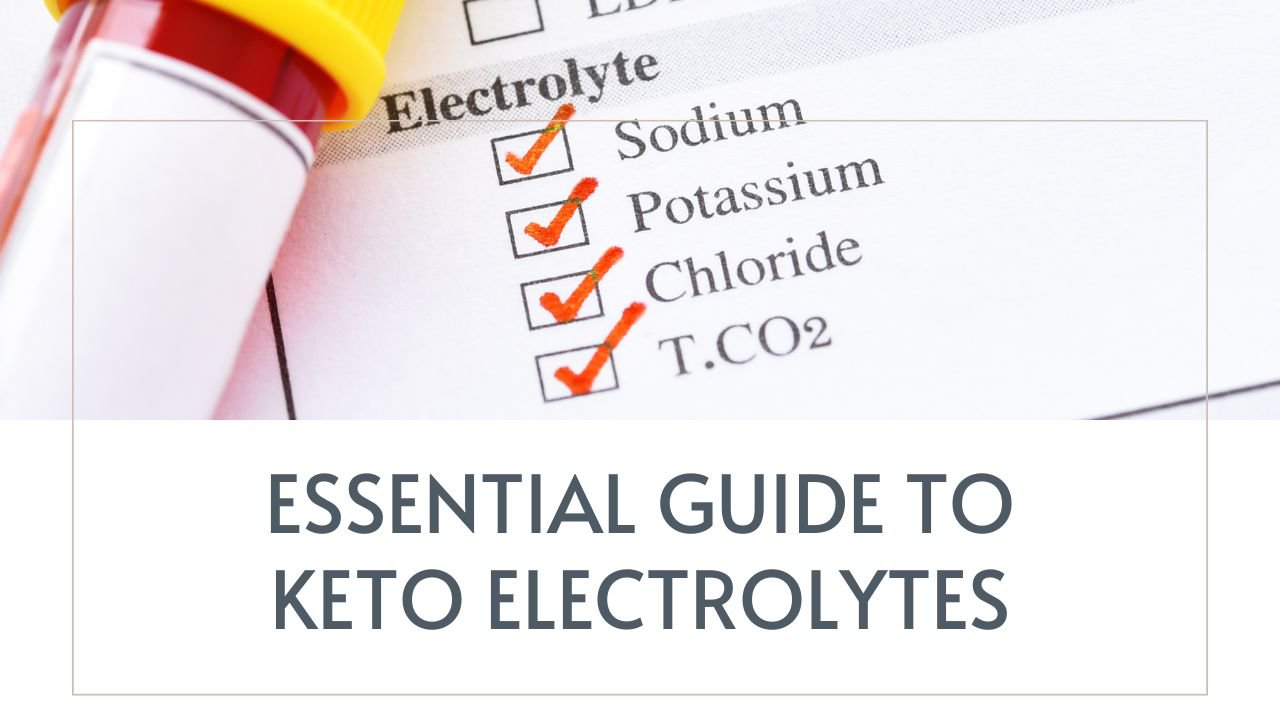Are you losing your energy while following a ketogenic diet? It might be your keto electrolytes. Here is your guide to maintaining balance effortlessly and staying at the top of your weight loss journey!

Hey there, keto Mamas! Let’s talk electrolytes – yes, those tiny but mighty elements that can make or break your keto game.
Imagine this: you’re sailing smoothly along your keto journey, feeling fantastic, and then out of nowhere, wham! Fatigue kicks in, your muscles tense up, and your heart decides to bust a move. Sound familiar?
Don’t stress – it could be time for an electrolyte check!
In this guide, we’re diving deep into the world of keto electrolytes. We’ll explore their functions, sources, and the best strategies for ensuring your electrolyte levels are optimized while following a ketogenic diet.
Get ready to unlock the secrets to maintaining optimal health and energy levels on your keto adventure.
What are electrolytes and why are they important on a keto diet?
Electrolytes are minerals found in our bodies that are crucial for proper functioning. They play a vital role in maintaining fluid balance, nerve function, muscle contractions, and regulating blood pressure.
The primary electrolytes include sodium, potassium, magnesium, and calcium. When following a keto diet, the body undergoes significant changes in its metabolism.
As carbohydrates are restricted, the body enters a state of ketosis, where it primarily burns fat for fuel. This shift in metabolism can lead to increased water loss and a higher excretion of electrolytes through urine.
An electrolyte imbalance can result in symptoms such as fatigue, muscle cramps, headaches, and even heart palpitations. This is commonly referred to as the “keto flu.”
To combat these symptoms and maintain optimal health, it is essential to replenish electrolytes regularly.
Sodium is especially important on a keto diet as it helps retain water and balance fluid levels in the body. Potassium supports muscle function and nerve communication.
Magnesium is crucial in energy production, muscle relaxation, and sleep regulation. Calcium is essential for strong bones and teeth, as well as proper muscle function.
To ensure adequate electrolyte intake on a keto diet, it is recommended to consume foods rich in these minerals or consider electrolyte supplements. Foods such as avocados, leafy greens, nuts, seeds, and seafood are excellent sources of electrolytes.
Additionally, using electrolyte powders or adding electrolyte drops to your water can help maintain optimal electrolyte levels.
Maintaining proper electrolyte balance is key to avoiding potential side effects and feeling your best while following a keto diet.
Keto electrolyte imbalances and their symptoms
One of the most common electrolyte imbalances on a keto diet is a low sodium level, also known as hyponatremia. Symptoms of hyponatremia include fatigue, headache, muscle cramps, confusion, and nausea.
When sodium levels are low, it is important to increase your intake of sodium-rich foods or consider adding electrolyte supplements to your diet.
Another electrolyte imbalance that can occur on a keto diet is low potassium levels, known as hypokalemia. Potassium is essential for proper muscle function, including the heart.
Symptoms of hypokalemia may include muscle weakness, fatigue, constipation, and irregular heartbeat. To combat this, incorporating potassium-rich foods such as avocados, spinach, and salmon into your diet is recommended.
Lastly, magnesium deficiency is another common electrolyte imbalance experienced by those following a keto diet. Magnesium is involved in over 300 enzymatic reactions in the body and is crucial for muscle and nerve function.
Symptoms of magnesium deficiency may include muscle cramps, insomnia, irritability, and heart palpitations. Increasing your intake of magnesium-rich foods like nuts, seeds, and leafy greens, or considering magnesium supplements, can help address this imbalance.
It’s important to note that electrolyte imbalances can vary from person to person, and it’s always advisable to consult with a healthcare professional when making significant dietary changes.
Monitor your electrolyte levels and address any imbalances to help ensure a smooth and successful keto journey.
The best food sources of keto electrolytes
Here are several food sources that can provide these electrolytes while adhering to a keto diet:
1. Avocado
This creamy fruit is not only rich in healthy fats but also a great source of potassium, a crucial electrolyte. Adding avocado to your meals or enjoying it as a snack can help replenish potassium levels and maintain proper muscle function.
2. Leafy Greens
Spinach, kale, and other leafy greens are not only low in carbs but also packed with essential electrolytes like magnesium and calcium. These nutrients are vital for maintaining nerve and muscle function and can be easily incorporated into salads, stir-fries, or smoothies.
3. Nuts and seeds
Almonds, walnuts, chia seeds, and flaxseeds are not only keto-friendly snacks but also excellent sources of electrolytes like magnesium and potassium. They can be enjoyed as a crunchy snack, added to salads, or used as toppings for keto-friendly desserts.
4. Coconut water
While water is crucial for hydration, coconut water is an excellent natural source of electrolytes, including potassium, magnesium, and sodium. It can be consumed in moderation to replenish electrolytes and maintain hydration levels.
5. Bone broth
This nourishing broth made from simmering animal bones is not only rich in collagen and protein but also a good source of electrolytes like sodium and potassium. Bone broth as a warm and comforting beverage can provide essential electrolytes while promoting overall health.
By incorporating these keto-friendly food sources into your diet, you can ensure an adequate intake of electrolytes while staying in ketosis.
Supplements for replenishing electrolytes on a keto diet
To ensure you stay on top of your electrolyte needs while on a keto diet, supplements can be incredibly helpful. Here are a few key supplements you should consider for replenishing electrolytes:
1. Sodium
Sodium is an essential electrolyte that often gets depleted on a low-carb diet. Consider adding a quality electrolyte supplement that includes sodium or simply adding a pinch of high-quality salt to your meals.
2. Potassium
Potassium is crucial for maintaining proper muscle and nerve function. Look for potassium supplements that are specifically formulated for keto diets. Alternatively, incorporate potassium-rich foods into your meals, such as avocados, spinach, and mushrooms.
3. Magnesium
Magnesium is involved in hundreds of biochemical reactions in the body, including energy production and muscle function. Due to its importance, many people, even those not on a keto diet, may be deficient in magnesium.
Look for magnesium supplements that are in a highly absorbable form, such as magnesium citrate or magnesium glycinate.
4. Calcium
Although calcium is not as heavily impacted by a keto diet, it is still important for bone health and other bodily functions. Ensure you consume enough calcium-rich foods, such as dairy products or non-dairy alternatives fortified with calcium.
While supplements can be beneficial, it’s always best to consult with a healthcare professional before adding them to your routine. They can help determine your specific electrolyte needs and guide you on the appropriate dosage to maintain optimal health while on a keto diet.
Tips for maintaining keto electrolytes balance
Here are some tips to help you maintain electrolyte balance while on a keto diet:
1. Increase your sodium intake
Sodium is an essential electrolyte that often gets depleted on a keto diet. You can add more sodium to your diet by salting your food or sipping on bone broth, which is rich in this crucial mineral.
2. Include potassium-rich foods
Potassium is another electrolyte that needs attention on a keto diet. Avocados, spinach, mushrooms, and salmon are excellent sources of potassium that you can incorporate into your meals.
3. Magnesium supplementation
Magnesium plays a vital role in maintaining muscle and nerve function. Since it can be challenging to get enough magnesium solely from food sources, consider taking a magnesium supplement to meet your daily requirements.
4. Stay hydrated
Proper hydration is essential for maintaining electrolyte balance. Drink plenty of water throughout the day and consider adding a pinch of salt or electrolyte powder to your water to help replenish lost minerals.
5. Monitor your symptoms
Pay attention to any signs of electrolyte imbalance, such as muscle cramps, fatigue, or headaches. If you experience these symptoms, increase your electrolyte intake or consult with a healthcare professional.
Electrolyte balance is an important aspect of overall health, especially when following a keto diet. By following these tips and being mindful of your body’s needs, you can maintain optimal electrolyte levels and support your ketogenic journey.
Are you prioritizing your keto electrolytes?
Maintaining a proper electrolyte balance is essential for success on a keto diet.
Electrolytes play a vital role in supporting your overall health and well-being while following a ketogenic lifestyle. By understanding their importance and incorporating them into your diet, you can ensure that you are providing your body with the necessary nutrients it needs to thrive.
Remember to stay hydrated and replenish electrolytes regularly to avoid any potential imbalances or deficiencies.
I hope this essential guide to keto electrolytes has provided you with valuable insights and knowledge to support your journey toward optimal health and wellness on the keto diet.
Start prioritizing your electrolyte intake today and enjoy the benefits of a well-rounded ketogenic journey.
More Keto articles to read:


This is a great information. I’ll take note of all your tips. Thank you for sharing this.
Thank you for reading my post, Sarah. Good luck on your weight loss journey. Stay hydrated.